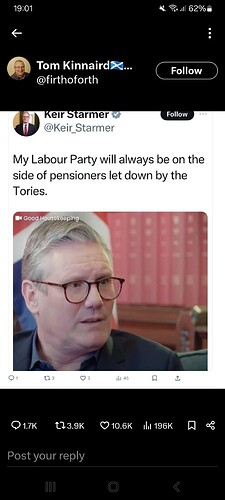For any others who might want to dig further into this, it’s from 30 April 2024:
https://x.com/Keir_Starmer/status/1785303047704346728
And quite honestly, I’m in two minds about this because @Dane is right that he’s not fulfilling the whole iron-clad assertion implied here, that he will always take care of the pensioners who are struggling to cope with the increases in costs of heating.
And quite honestly, I personally am withholding my judgement until we have a better idea of what the impact is. For now, based on the state of things, I think they have the core of a decent idea, which is means-testing the payments to be able to afford it for those people who genuinely need it, again presuming that the fiscal black hole is genuine.
The problem is that people have differing situations, and the cut-off is a binary one – either you qualify, or you don’t.
The heating costs for someone in a well-insulated home with a heat pump are always going to be lower than someone who lives in an old house with an oil heater. What works for one cost-wise will not work for another. It’s also not as simple as saying “well you could move then”, because the housing market isn’t that liquid, and there isn’t enough time.
As far as I can understand, Pension Credit has a hard boundary for qualification, when in reality, you’d ideally like to see the support taper off with income. This would mean that there are potentially many vulnerable people who are just about on the wrong side of the cutoff who face a cliff edge and would be in a significantly worse position.
Furthermore, I believe I’ve read that Labour have also trotted out the argument that the state pension uprating (What is the state pension triple lock and what is it worth? - BBC News) will help cover that. It may, especially since the 4% increase outstrips the CPI and the RPI inflation for the last 12 months, which are 3.1% and 3.5% respectively. However, gas prices are going to go up 14% per unit, and I don’t even know about heating oil prices, and depending on the proportion of household expenses, this could tip them over into being unable to afford it.
Taking a step back, what Labour is essentially betting on in terms of impact, is that the pensions credit eligibility cutoff is a good indicator of whether the household genuinely needs support for energy prices, and that those people losing the payment could afford it anyway. The problem with this however is that even if the impact is limited to just a handful of people, the impact on them individually could be catastrophic.
Again, this might be a minority of pensioners, but it still means that the promise would not be fulfilled. That’s also assuming that all of Labour’s hopes with regards to pension credit takeup can be fulfilled.
It could of course still turn out that the impact is minimal, and the only people losing the payment are people who could afford it anyway. My suspicion however is that this isn’t going to be the case.
But as to the point about promises, I can see where you’re coming from, since that video was explicitly discussing the problems that some pensioners have with trying to keep the heating on. But he didn’t promise that winter fuel payments would stay for everyone, nor that energy bills would not go up (which he has no power over in any case). All he has implied is that he would take care of the pensioners who are struggling to keep the heating on, and we haven’t seen if that’s a promise that has been kept or not. I think it’s an immense risk that quite likely means it will not be kept, but they seem confident that it will be.
Either way, I’m not sure it’s something they should want to be spending precious political capital on, unless they’re confident about their ability to limit its adverse impacts. I’m not confident that is the case, but I think we at the very least ought to wait for the autumn budget to see.
EDIT:
Link to inflation data: Inflation and price indices - Office for National Statistics


